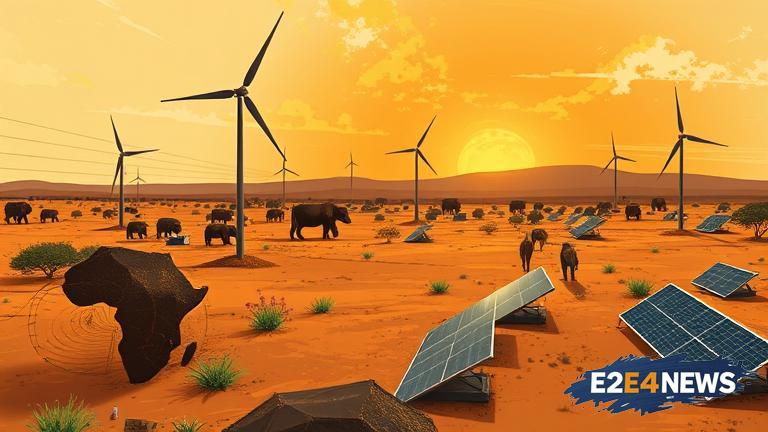The African continent is witnessing a significant shift towards renewable energy, driven by the need to address the pressing issues of energy access, energy security, and climate change. With a growing population and increasing economic activities, the demand for energy in Africa is on the rise. However, the continent’s reliance on fossil fuels has led to concerns about greenhouse gas emissions and their impact on the environment. In response, many African countries are now exploring alternative energy sources, such as solar, wind, hydro, and geothermal power. The use of renewable energy is not only helping to reduce carbon emissions but also creating new opportunities for economic growth and development. For instance, the development of solar farms and wind parks is generating employment opportunities and stimulating local economies. Moreover, the adoption of renewable energy is also improving energy access, particularly in rural areas where traditional energy infrastructure is often lacking. In countries such as South Africa, Kenya, and Egypt, renewable energy is becoming an increasingly important part of the energy mix. The South African government, for example, has set ambitious targets to increase the share of renewable energy in the country’s energy mix to 42% by 2030. Similarly, Kenya has made significant strides in developing its geothermal resources, with the Olkaria Geothermal Complex being one of the largest in the world. Egypt, on the other hand, is focusing on developing its solar and wind resources, with several large-scale projects currently under construction. The growth of renewable energy in Africa is also being driven by declining technology costs and innovative financing models. The cost of solar panels and wind turbines has fallen dramatically in recent years, making renewable energy more competitive with fossil fuels. Additionally, new financing models, such as power purchase agreements and green bonds, are providing developers with access to capital and enabling them to build large-scale renewable energy projects. Despite the progress being made, there are still significant challenges to be addressed, including the need for greater investment in energy infrastructure and the development of more effective policies and regulations to support the growth of renewable energy. Furthermore, the integration of renewable energy into existing energy systems will require significant upgrades to grid infrastructure and the development of new technologies, such as energy storage systems. Nevertheless, the potential benefits of renewable energy for Africa are substantial, and the continent is well-placed to become a leader in the global transition to a low-carbon economy. With its abundant natural resources and growing demand for energy, Africa has the opportunity to leapfrog traditional energy systems and develop a more sustainable and equitable energy future. The development of renewable energy in Africa will not only help to reduce greenhouse gas emissions but also improve energy access, stimulate economic growth, and enhance energy security. As the continent continues to grow and develop, it is likely that renewable energy will play an increasingly important role in shaping Africa’s energy future. In conclusion, the growth of renewable energy in Africa is a positive trend that has the potential to transform the continent’s energy landscape and contribute to a more sustainable and equitable future. The use of renewable energy is not only good for the environment, but it also has the potential to drive economic growth, improve energy access, and enhance energy security. As the world continues to transition to a low-carbon economy, Africa is well-placed to play a leading role in the development and deployment of renewable energy technologies.





